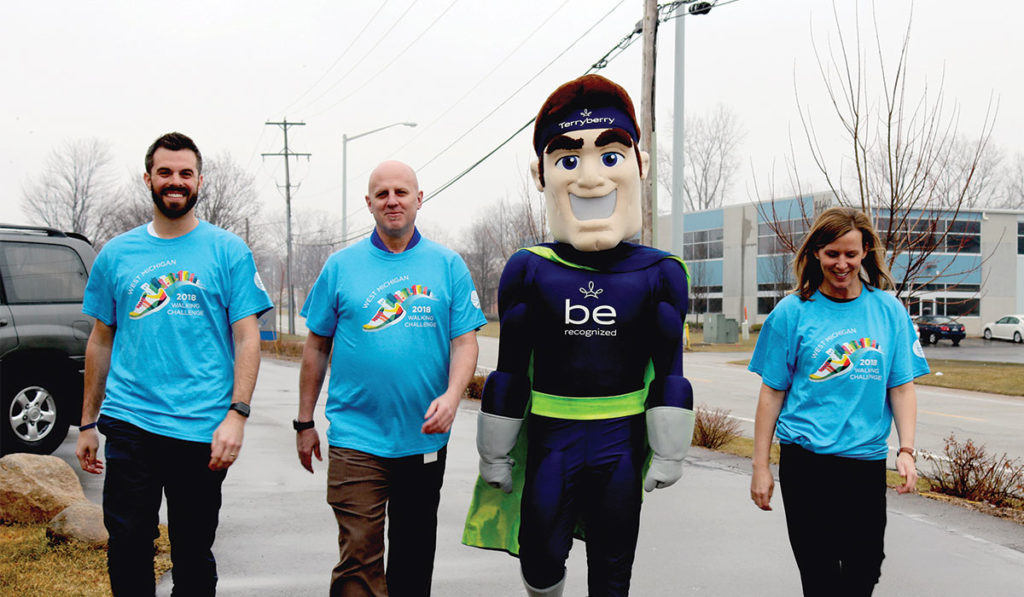
For decades, we’ve known that increased activity leads to an overall healthier lifestyle. In recent years this mentality has crept into our workday, too. For managers, the struggle becomes how to encourage our workforce to get up and take fitness breaks when our ultimate focus should be on productivity and meeting business objectives between the hours of 9 a.m. and 5 p.m.?
Ironically, research shows that when employees are encouraged to get away from their desks and intentionally increase movement, productivity increases. Researchers attribute this to the fact that aerobic activity gets blood pumping and regulates hormones in a way that calms nerves, reduces stress and battles burnout.
Last year, James Levine, M.D., a professor of medicine at the Mayo Clinic in Scottsdale, was quoted as saying, “Sitting is more dangerous than smoking, kills more people than HIV and is more treacherous than parachuting. We are sitting ourselves to death.” This statement is not only shocking, it is causing many companies — large and small — to reevaluate their policies about increased activity at work.
Currently, the average American adult sits for 13 hours a day. Paired with the standard eight hours of sleep each night, this leads to a significantly sedentary lifestyle. This reality, often termed as “sitting disease,” is associated with an elevated risk of 34 chronic diseases that include obesity, diabetes, cancer and cardiovascular disease.
In a New York Times article, researchers found standing up and walking around for as little as 5 to 10 minutes every hour made a real difference in a person’s quality of life — not only at work but in their personal lives, too. Benefits of incorporating movement included a lift in mood, stress reduction and less fatigue without reducing focus or attention. Plus, regular movement even helped battle hunger pangs.
But, how do companies balance workloads with increased activity?
Since many employers are starting to see the benefit of increased activity at work — not only in their employees’ health but on their bottom line as well — companies are looking for ways to motivate employees to step up activity during work hours. From standing workstations and treadmill desks to Fitbit and walking competitions, companies are making movement at work a viable option.
Many organizations in and around Phoenix have decided it’s time to prioritize activity in the workplace. Companies like Arizona Helping Hands, the United Dairymen of Arizona and the Make-a-Wish America organization recently participated in the inaugural Terryberry Arizona Workplace Walking Challenge. The six-week business-to-business competition included nearly 2,000 local employees. The challenge encouraged overall employee wellness and rewarded participants for meeting daily step goals.
During the Walking Challenge, Arizona Helping Hands even converted its 18,000-square-foot warehouse into a walker’s paradise. Orange cones were set up so employees could briskly walk laps throughout the day. And, while participants said it was often tricky to rip themselves away from their desks or projects to get in a walk, they did report they were more focused, clear-minded and, ultimately, more productive after having stepped away for a short activity break.
The increased interest in wellness programs in the U.S. demonstrates that employers value their staff members’ wellbeing and overall health. They also realize that a healthy work environment means employees take fewer sick days, ask for less time off for doctors’ appointments and have lower health insurance premiums. Plus, employers found employees who get up and move during the workday are overall more satisfied, more productive and less likely to search out other jobs.
Alex Allion is western U.S. sales director of Terryberry, with more than 20 years of experience providing skillful leadership through the effective communication of the company’s corporate vision, including thought-leadership to hundreds of organizations on developing and implementing recognition strategies to enhance talent engagement and employee retention.



















